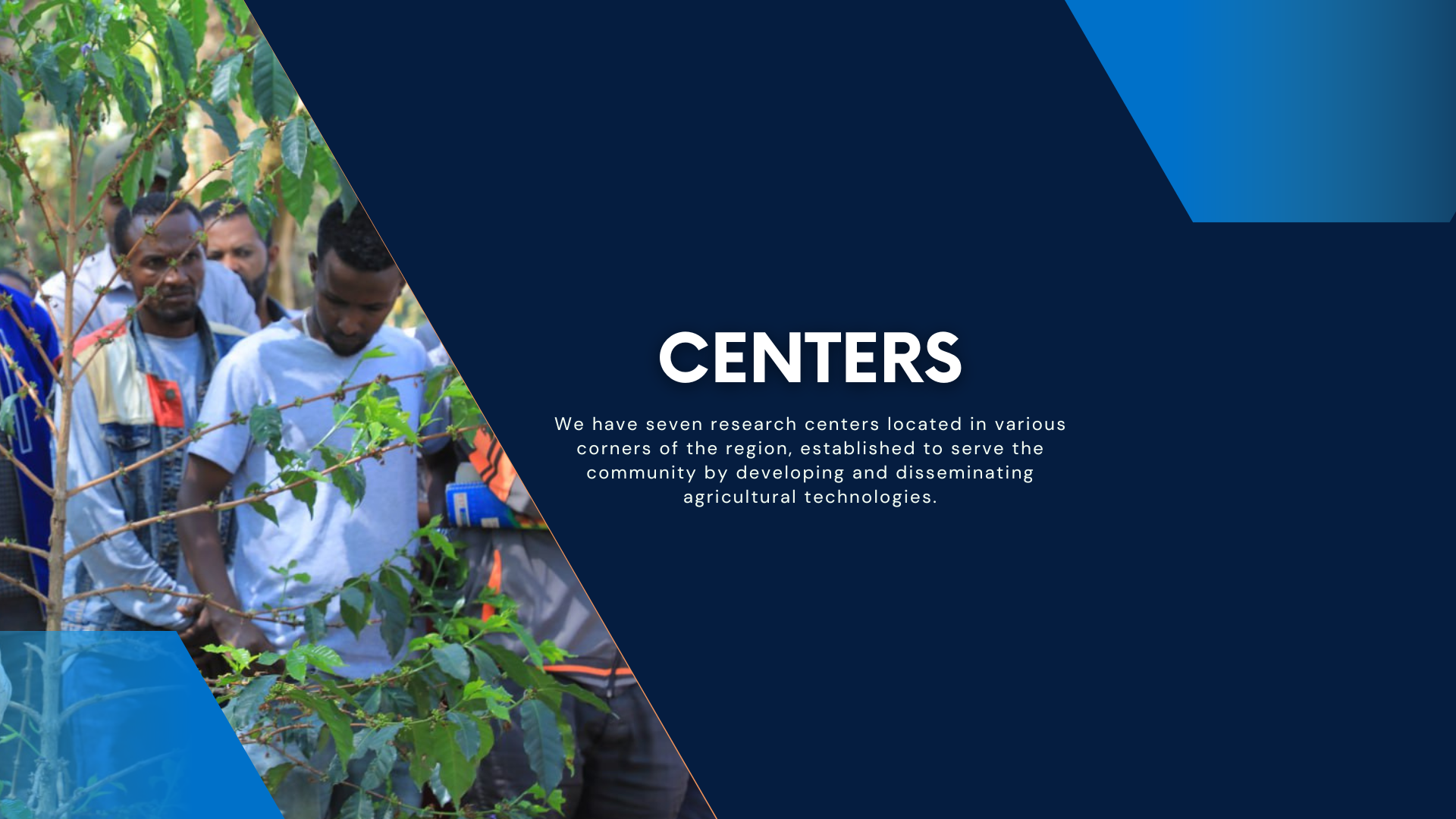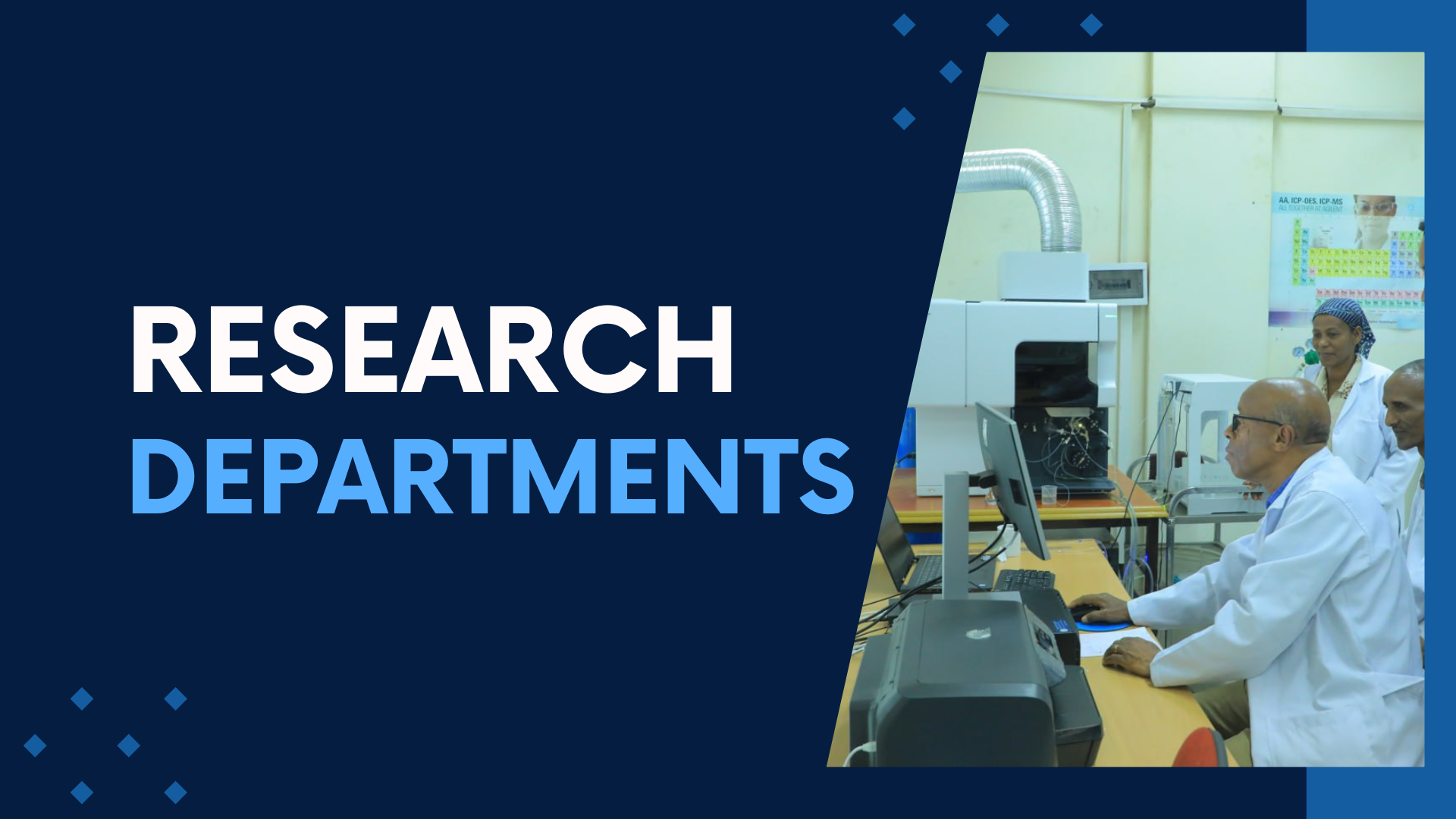Research Centers

|
|
|
Adet Agricultural Research Center (AARC)Adet Agricultural Research Center, established in 1978 E.C., is located in Adet Kebele 02, within the Yilmana Densa Wereda of the N/Gojam Zone in the Amhara region. The center's geographical coordinates are 11° 16' 32" latitude and 37° 29' 30" longitude, at an elevation of 2216 meters. The center's mandate covers the West Amhara area, including East Gojam, West Gojam, Awi Zone, North Gondar, and South Gondar. Adet Agricultural Research Center focuses on various agricultural sectors, including variety improvement, agronomy protection, soil fertility, agricultural water management, soil and water conservation, seed research and multiplication, and agricultural economics and extension. The center conducts research on major cereals, horticultural crops, pulses, and oil crops. Andassa Livestock Research Center (ALRC)Andassa Livestock Research Center, initially established in 1964 as a Cattle Breeding and Multiplication Ranch by the USA point-four project, aimed to conserve and improve Fogera cattle under the Ministry of Agriculture (MOA). In subsequent years, the center expanded its mandate to include breeding, multiplying, and distributing Fogera cattle crossed with Holstein Friesians, as well as reproducing chickens. By 2000, it was renamed and placed under the Amhara Regional Agricultural Research Institute (ARARI) with a focus on generating, adopting, and promoting market-oriented livestock technologies to enhance the livelihoods of livestock producers. The center conducts scientific research on livestock production constraints in the western Amhara Region and develops technologies applicable across the country. Bahir Dar Fishery and Other Aquatic Life Research Center (BFALRC)The Bahir Dar Fishery and Other Aquatic Life Research Center is dedicated to generating, adapting, and promoting various fishery-related research technologies aimed at improving the living conditions of the local community. The center has made significant strides in fishery management and aquatic biodiversity conservation across various water bodies within its jurisdiction. In addition to its research initiatives, the center has successfully multiplied and distributed large quantities of fish fingerlings, which serve as initial seeds for aquaculture farmers and help restock both small and large water bodies in the region. These efforts underscore the center's commitment to sustainable fishery practices and the enhancement of aquatic life, contributing to the overall economic and environmental well-being of the community. The Bahir Dar Fishery and Other Aquatic Life Research Center is organized into four research case teams, each with distinct roles and responsibilities. The Aquaculture Case Team is dedicated to developing innovative and practical aquaculture technologies, including feed solutions. The Fishery Management Case Team focuses on providing research-based recommendations to promote sustainable fishery practices. The Limnology Case Team examines the quality and properties of water in relation to fisheries, ensuring a healthy aquatic environment. The Socioeconomics and Research Extension Case Team conducts feasibility studies on the technologies developed by the other teams, performs various survey-based research such as impact assessments, adoption studies, efficiency evaluations, and valuation. This team also plays a crucial role in promoting these technologies to a broader range of farmers through pre-extension demonstrations, pre-scaling up, and scaling out initiatives. Together, these teams contribute to the center's mission of improving community living conditions through advanced fishery research and sustainable practices Debre Birhan Agricultural Research Center (DBARC)The Debre Birhan Agricultural Research Center (DBARC) was initially established in 1965 E.C. as part of the Sheno Agricultural Research Station under the Holeta Agricultural Research Center. It became a dedicated agricultural research sub-center in Sheno in 1978 E.C. and was renamed Sheno Agricultural Research Center (SARC) in 1988 E.C. In 1997 E.C., the center was relocated to Debre Birhan and subsequently renamed to reflect its new location. Now one of the main research centers under the Amhara Agricultural Research Institute, DBARC is situated in the North Shewa Zone of the Amhara Region, approximately 120 kilometers northeast of Addis Ababa and 10 kilometers from Debre Birhan city. The center coordinates its research activities through six directorates focusing on Crop, Livestock, Soil and Water, Forestry, Socio-economics and Agricultural Extension, and Technology Multiplication and Seed Research. Supporting these directorates are four divisions: Procurement, Finance and Property Management, Human Resources, Planning and Budgeting, Monitoring and Evaluation, and Internal Audit. The mission of DBARC is to generate, develop, and adapt agricultural technologies, information, and knowledge to support overall agricultural development and benefit its stakeholders. It aims to promote improved agricultural technologies through demonstration, popularization, and scaling, while also focusing on the multiplication and dissemination of agro-ecologically sound technologies. The center's mandate covers scientific research on agricultural production challenges in the Eastern part of the Amhara Region, particularly in the North Shewa Zone, which is rich in natural resources and has significant livestock and crop potential. Nationally, DBARC manages the sheep research project, and regionally, it oversees research on cereals, pulses, highland fruits and vegetables, livestock, soil and water management, forestry, and socio-economics. Gonder Agricultural Research Center (GARC)The Gondar Agricultural Research Center (GARC), established in 2000, is a public research institution based in Gondar, Ethiopia. Its mission is to develop, adopt, and disseminate agro-ecologically sound agricultural technologies to improve the livelihoods of the local population. GARC operates under the Amhara Regional Agricultural Research Institute (ARARI) and is structured into six research directorates: crop research, soil and water research, livestock research, forestry research, socioeconomic and agricultural extension, and technology multiplication and seed research. The center employs 129 staff members, including 95 research staff, and has facilities such as laboratories, meeting halls, and farm machinery. GARC conducts its activities across West Gondar, Central Gondar, North Gondar, and Welkiet Tegede Setit Humera administrative zones. The center collaborates with local and international partners, including universities and research institutes, to generate technologies for improved crop productivity, water management, livestock development, and forestry. GARC has made significant achievements in areas like crop water requirement research, irrigation methods, and the introduction of eco-friendly technologies. The center's financial support comes from the government and various collaborators, enabling it to continue its commitment to agricultural technology generation and capacity building. Sekota Dryland Agricultural Research Center (SDARC)Sekota Dry-land Agricultural Research Center (SDARC), established in 2002, is geographically located at an altitude of 2265 meters, latitude 504219, and longitude 1396994 in Waghimra Zone, Sekota Woreda, 01 kebele. The center's mandate area covers the North-Eastern region of Amhara, including Waghimra Zone and four administrative districts from North Wollo. The center focuses on the genetic improvement of goats at Abergelle and the enhancement of honey bee production. In terms of crops, the primary focus is on pearl millet, sorghum, mung bean, sesame, haricot bean, wheat, teff, field pea, and faba bean. SDARC is equipped with several laboratories, including soil, apiculture (bee and bee product), animal health, crop protection, and seed laboratories. The center also has multiple field stations and experimental farms. Sirinka Agricultural Research Center (SARC)Sirinka Agricultural Research Center, established in 1986, is located in North Wollo, Habru Woreda, and 03 Kebele. The center's mandate geographical area includes Stayish, Jama, Jari, Gobeya, Kobo, and Sirinka. It focuses on sorghum, common bean, and tropical fruit crops. The research priorities are technology generation, adaptation, promotion, and initial seed multiplication. The center has research sub-centers at Kobo and Haik, and research laboratories for soil, pathology, entomology, and animal health, though these are under reestablishment due to damage from the Northern Conflict. Field stations are located in Sirinka, Kobo, Jarie, Jama, Gimba, Gobeya, Estayesh, Geregera, and Kutaber, with a total area ranging from 0.365ha to 45ha. |
Research Sections
